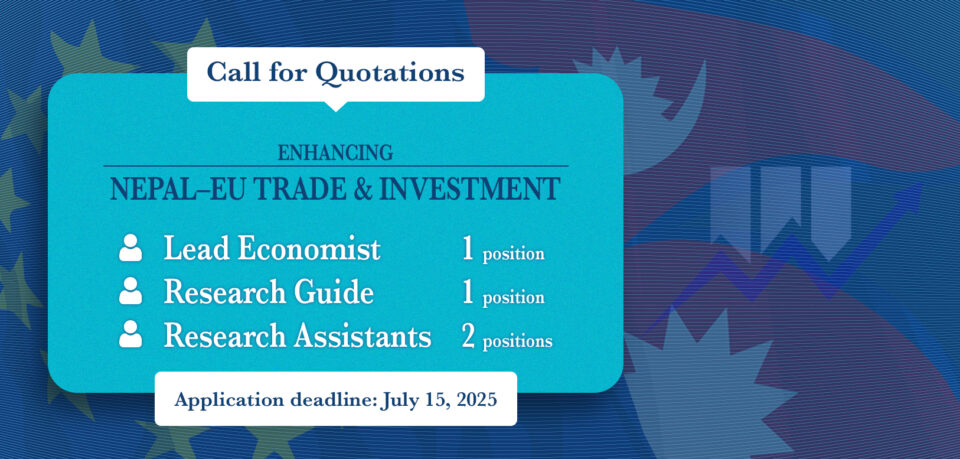Background
By 2026 Nepal will graduate to a lower-middle-income country. As a result, grants that Nepal previously received will no longer be an option for fulfilling its development aspirations. Consequently, the share of debt-to-GDP which is already 45 percent is likely to increase. As a country that scores low on metrics of transparency, debt financing as a strategy for Nepal is neither desirable nor sustainable. Moving forward the desirable option for Nepal is to rely on trade and investments as a strategy for economic growth.
To date, India and China are Nepal’s major trading partners. But given the geopolitical realities of Nepal i.e. of interest to both nations and on the receiving end of geopolitical manoeuvring by both nations, the country must diversify its trade portfolio. Currently, Germany is the third largest trading partner of Nepal. Nepal exports agricultural products and textiles to Germany while importing technologies and equipment from Germany. In addition, the trading partnership between the European Union and Nepal has seen remarkable growth in the past few years. In 2023 alone, there was a 6.5% growth in export value from Nepal to the European Union, accompanied by a remarkable increase of 28% in imports from the European Union. However, the policy and regulatory bottlenecks have kept Nepal from realizing its full trading potential with Germany and the European Union.
Diversifying the trade and investment portfolio thus requires an understanding of the legal and policy arrangements of trade between Nepal and Germany, Nepal and the European Union, and Nepal’s current investment regime. It also requires an identification of institutions that need strengthening to leverage the growing market in these economies. The proposed project, thus, is an attempt to understand the myriad of issues surrounding trade and investment between Nepal and the European Union, with special focus on the bilateral relation between Nepal and Germany.
At its core, the goal is to prepare Nepal to benefit from the European market while simultaneously nudging the state apparatus towards a trade-and-investment-focused economic growth strategy rather than a debt-financed strategy. Given the previous engagement between FNF and Nepal, the foundation can draw on the knowledge and expertise of previous FNF alumni to inform this undertaking.
Methodology
The program has two components: research and advocacy. The research team will consult with sectoral experts to identify specific problems in Nepal-EU trade and investments, and the regulatory hurdles increasing the trade lag. The team will make meticulous efforts to engage German agencies in Nepal such as the German Embassy, the GIZ, and the likes. It will then identify and propose evidence-based solutions to improve Nepal’s trade and investment regime. After the preliminary study, the team will again consult with sectoral experts and policymakers to further improve and finalize the research.
The team will then organize a launch event to further spread the insights generated from the study.
In the meantime, Samriddhi will also promote the research via its social media platforms by sharing infographics created based on the research and event promotional posts.
Timeline
The program will last for six months (including reporting) from July 2025 to December 2025.
Positions
- Lead the overall research process and ensure quality control of deliverables.
- Design the research framework and methodology in consultation with Samriddhi Foundation.
- Identify key policy, institutional, and regulatory barriers in Nepal–EU trade and investment.
- Draft and finalize the research report, incorporating feedback from consultations and peer reviews.
- Provide policy recommendations for strengthening Nepal–EU economic relations.
- Support the team in preparing briefing materials for dissemination events.
The consultant should have the following qualifications:
- Have a Master’s degree or higher in Social Science,
- Have at least 5 years’ experience on related field.
- Provide strategic direction and academic guidance to the research team.
- Review research design, tools, and preliminary findings.
- Advise on analytical approaches and ensure methodological rigor.
- Support the Lead Economist and Research Assistants in refining the research report.
- Offer mentorship to team members and help align the study with international research standards.
The consultant should have the following qualifications:
- Have a Master’s degree or higher in Social Science,
- Have at least 5 years’ experience on related field.
- Conduct literature reviews, collect secondary data, and assist in field consultations.
- Support in data entry, analysis, and documentation.
- Assist in drafting chapters, tables, and visuals for the research report.
- Coordinate with stakeholders and contribute to organizing expert consultations.
- Prepare infographics and social media briefs summarizing key findings.
The consultant should have the following qualifications:
- Have a Bachelor’s degree or higher in Social Science,
- Have at least 3 years’ experience on related field.
Objectives
- To identify and dismantle key barriers in the Nepal–EU trade and investment regime, and to provide liberal, market-based solutions that expand opportunities for businesses, attract investments, and unlock greater market access on both sides.
- To build awareness among Nepal’s urban middle classes, multipliers, and decision-makers across civil society, academia, business, media, administration, and politics about liberal values and market-based problem-solving approaches as effective pathways to overcoming freedom deficits and unlocking opportunities for trade, investment, and growth.
- To engage with German agencies in Nepal such as the German Embassy, GIZ, and similar institutions to promote Nepal-Germany trade and investment relations, while ensuring that proposed initiatives reflect liberal principles of open markets, voluntary exchange, and institutional reforms that reduce rent-seeking and expand genuine economic opportunity.
Submission Requirements
Interested individuals are requested to submit the following documents by July 15 2025:
- A Curriculum Vitae (CV) highlighting relevant experience.
- A quotation (financial proposal) specifying daily rates and total expected remuneration based on the number of working days indicated for each position.
Please email your application to [email protected] with the subject line:
“Quotation – [Position Title] – Enhancing Nepal–EU Trade & Investment.”

